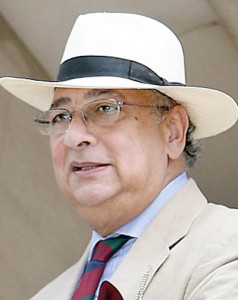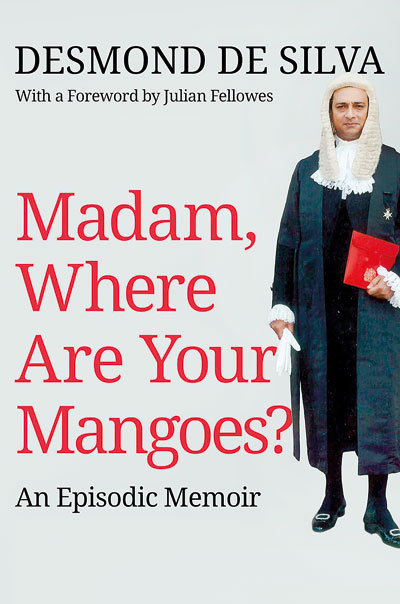Sunday Times 2
A fascinating biography of a fascinating man
Desmond de Silva was born in the colony of Ceylon in the early months of WWII, the only son of a barrister and grandson of a Minister in the War Council set up by Britain. Ceylon faced an onslaught of the, up till then, victorious Japanese forces. His life in retrospect, as seen through these episodic memoirs, has a “Boys Own” quality.

Desmond de Silva
After the Japanese entered the war in 1941, Ceylon was in the front line. Winston Churchill appointed Lord Louis Mountbatten (as he was then known) as Supreme Allied Commander South East Asia Command which was based at Peradeniya, just outside Kandy. Because Desmond’s grandfather George E. de Silva was a member of the Ceylon War Council, the regularity of visits by Mountbatten to his grandfather’s home led to Desmond calling him “Uncle Dickie”. Four decades later, he was to marry Mountbatten’s great niece, Princess Katarina of Yugoslavia.
These memoirs deal with an oft forgotten fact that by April 1942, by reason of the Imperial Japanese forces overrunning the rubber producing countries in SE Asia, Ceylon was the only reliable source of rubber for the Allies. If Ceylon had fallen to the Japanese, the possible impact on the Allied invasion of Europe would have been enormous. Artificial rubber was in its infancy and needed oil in any event.
It was a colonial boyhood with visits to the family rubber and tea estates in the highlands of Ceylon, swimming in gin clear waters of rock pools formed by estate waterfalls with shooting parties and visits from celebrities such as Laurence Olivier and his wife Vivien Leigh, Gregory Peck, William Holden and other great screen stars who came to Ceylon to act in films, often with a WWII background. The young de Silva was sent to Dulwich College Prep. School in 1951, returning later to Ceylon and entering Trinity College, Kandy. He was called to the Bar at the Middle Temple in 1984, and entered the famous chambers of the Rt. Hon. Sir Dingle Foot, Q.C., which due to Foot’s being Solicitor General was then under the leadership of Noel Gratiaen, Q.C., the former Attorney General of Ceylon.
With over 50 years practice in the courts of England and the Commonwealth, he carved out a unique reputation as a great defence counsel earning the sobriquet “The Scarlet Pimpernel”. However, his greatest legal achievement will perhaps be the role he played in 2002 in the arrest and bringing to justice for war crimes the first head of state to be convicted of war crimes since Grand Admiral Doenitz in the Nuremberg trials in 1946.
Julian Fellowes, the well-known author of Gosford Park and Downton Abbey, has said of Sir Desmond:
“His determination to bring Charles Taylor, former President of Liberia, to trial is just one example of why Desmond belongs in the history books. Being then the only British Q.C. to have been appointed by the United Nations as Chief Prosecutor of an international war crimes tribunal, he managed to bring about the arrest of Taylor whose conviction in 2012 for war crimes and crimes against humanity was the first of its kind since the Nuremberg trials in 1946 when Grand Admiral Doenitz, who had succeeded Hitler, was tried and convicted.”
Having secured the arrest of Charles Taylor and his transfer to Freetown, Sierra Leone, de Silva, for reasons of regional security, then had Taylor transferred to The Hague for trial.
Once that was accomplished, in 2006 de Silva retired as Chief Prosecutor, leaving his successor to conduct the trial and bring out the evidence of a war that was all about “blood diamonds” and Taylor’s involvement in a decade-long savage civil war to secure the diamond wealth of Sierra Leone. It was a trial in which the international super model Naomi Campbell gave evidence together with the actress Mia Farrow.
These episodic memoirs include excerpts from his diaries. One entry for the 9th June 2003 is most revealing in that it gives an insight into steps taken to prevent an invasion of Sierra Leone by Taylor’s forces after the Special Court for Sierra Leone was set up.
Desmond de Silva’s adventurous life has involved being shot at, imprisoned, with an attempted poisoning thrown in for good measure. The other side of the coin is that he saved a future Commonwealth head of government from execution, became the Queen’s Counsel of choice for footballers, jockeys and other sporting celebrities facing serious criminal trials, inherited a magic island Taprobane in Sri Lanka, married a royal princess, was knighted by The Queen under a Labour Government and appointed a Privy Councillor under a Conservative one.
Madam, Where Are Your Mangoes?is a fascinating biography of a fascinating man – who has produced a revealing portrait of Britain’s post-war social, political and cultural landscapes, and is a testament to the importance of the rule of law in society.
And what of the unique title Madam, Where Are Your Mangoes?
As the author explained to me, the intriguing title owes its exotic origin to when the author, then only 28 and junior to the bon vivant Noel Gratiaen, Q.C., unwittingly took rooms in a West African brothel some 50 years ago when they were in Freetown on a capital case. Having spent some time at the bar drinking brandy among revealingly dressed ladies of the night, one of them approached the portly Q.C. and politely offered some mangoes when the author and his leader were crossing a compound at midnight to get to their rooms. A few minutes later the author, disturbed by sounds in the corridor outside, was, on opening his bedroom door, confronted by the spectacle of the eminent Q.C. towering over the naked to the waist prostitute, plaintively wailing, “But madam, where are your mangoes?”
For all those who are even vaguely interested in the British Empire and colonies in the years after 1939 and the beginning of the Second World War, this sometimes hilarious, often buoyant, occassionally disturbing, but always enthralling autobiography is compulsory reading. Desmond de Silva’s extraordinary achievements are intermittently beyond belief. We are lucky to have this account of a remarkable career in a remarkable era.
-Sir Christopher Ondaatje is the author of The Last Colonial.
( The Sri Lankan Anchorman, Toronto, Canada)

